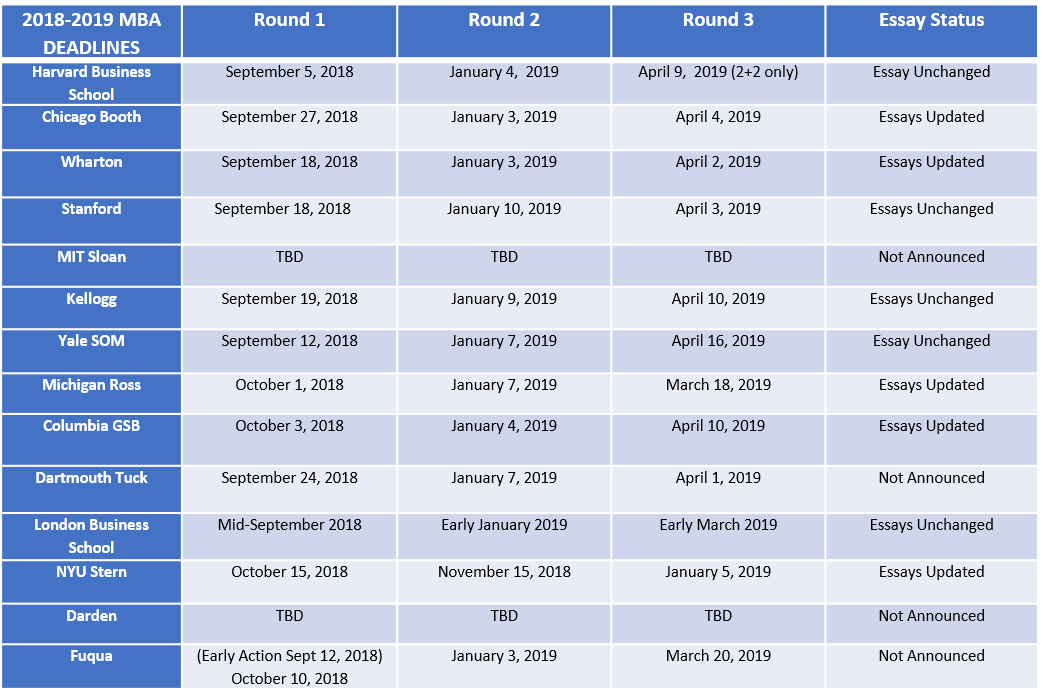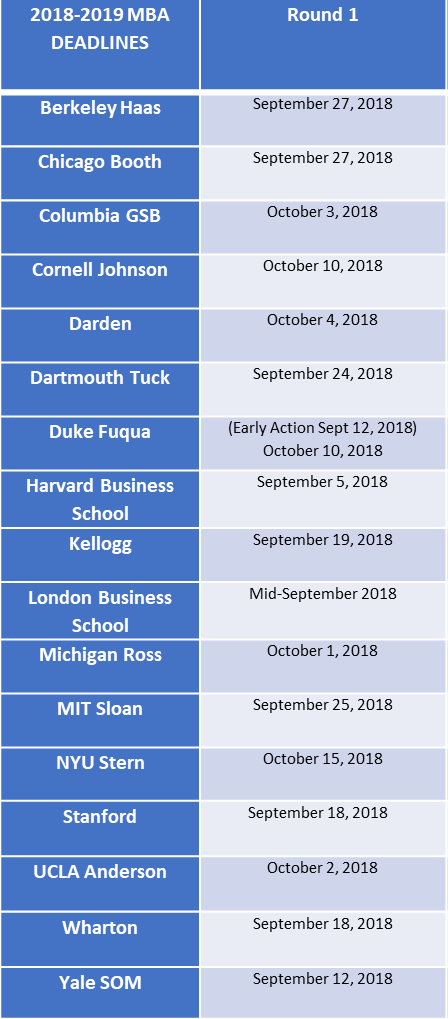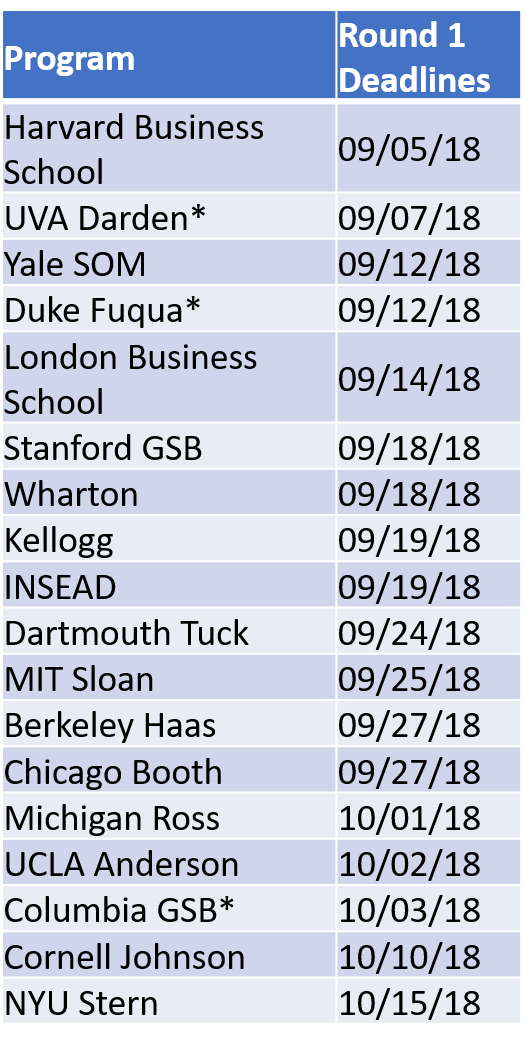Events & Promotions
|
|

GMAT Club Daily Prep
Thank you for using the timer - this advanced tool can estimate your performance and suggest more practice questions. We have subscribed you to Daily Prep Questions via email.
Customized
for You
Track
Your Progress
Practice
Pays
Not interested in getting valuable practice questions and articles delivered to your email? No problem, unsubscribe here.
- Nov 19
09:00 AM PST
-10:00 AM PST
What’s in it for you- Live Profile Evaluation Chat Session with Jenifer Turtschnow, CEO ARINGO. Come with your details prepared and ARINGO will share insights! Pre-MBA Role/Industry, YOE, Exam Score, C/GPA, ECs Post-MBA Role/ Industry & School List. - Nov 19
10:00 AM EST
-01:00 PM EST
Get expert MBA strategy, instant essay feedback, and personalized advice on your entire application. Join My Admit Coach, the AI-powered MBA admissions platform built on 10K+ successful application docs for HBS, Stanford GSB, MIT and other top programs. - Nov 19
11:00 AM EST
-12:00 PM EST
Looking to secure a coveted spot at a top business school? Our team of seasoned MBA admissions consultants, including top B schools alumni and industry leaders, is here to help turn your dreams into reality. Let’s kick-start your journey to success! - Nov 19
11:00 AM PST
-12:00 PM PST
Round 2 is here — and it’s your chance to make your MBA dream happen! Join GMAT Club’s LIVE discussion with two top experts from The Red Pen, Gunjan Jhunjhunwala and Natasha Mankikar, as we break down everything you need to know - Nov 20
07:30 AM PST
-08:30 AM PST
Learn what truly sets the UC Riverside MBA apart and how it helps in your professional growth - Nov 12
01:00 PM EST
-11:59 PM EST
Get expert MBA strategy, instant essay feedback, and personalized advice on your entire application. Join My Admit Coach, the AI-powered MBA admissions platform built on 10K+ successful application docs for HBS, Stanford GSB, MIT and other top programs. - Nov 20
10:00 AM EST
-10:30 AM EST
If you’re applying to Columbia, NYU Stern, or Yale SOM, you need more than strong stats. Each school defines “leadership” differently, and your essays must reflect that. Join Sia Admissions founder, Susan Berishaj on November 20th - Nov 20
09:00 PM IST
-10:00 PM IST
Join our free expert-led Essay Workshops to discover how to choose impactful stories, highlight your core values, and align your background with each school’s distinct culture, making every word truly count. - Nov 21
08:30 AM EST
-09:15 AM EST
Get the inside scoop on what makes Emory’s Goizueta Business School great, learn how you can present a strong MBA application, and connect with an Admissions Director to get your questions answered. - Nov 21
12:00 PM EST
-12:30 PM EST
Join Assistant Dean for Admissions Laurel Grodman for a live walkthrough of the 2025–2026 MBA application. Laurel will provide insights into what the Admissions Committee looks for and offer tips on key components of the application. - Nov 21
09:30 PM IST
-10:30 PM IST
Learn how to craft powerful, authentic essays by mastering the 3 “WHYs” every top MBA program looks for: Why MBA, Why Now, and Why This School. - Nov 24
08:00 PM PST
-09:00 PM PST
Inquire for a free profile evaluation and guarantee statement for possible admits and scholarships!
PersonalMBACoach
 Expert
Expert
Personal MBA Coach Founder
Joined: 11 Sep 2010
Last visit: 19 Nov 2025
Posts: 3,756
Own Kudos:
Given Kudos: 11
Status:Boutique MBA Admissions Consulting from a Wharton graduate - Helping applicants get into top global business schools since 2008
Affiliations: Wharton, MIT
Location: United States (NY)
Overall Client Admit Rate: 96%
Expert reply
Originally posted by PersonalMBACoach on 07 Jun 2018, 08:01.
Last edited by PersonalMBACoach on 27 Jun 2018, 10:16, edited 1 time in total.
Last edited by PersonalMBACoach on 27 Jun 2018, 10:16, edited 1 time in total.
Kudos
Bookmarks
| FROM Personal MBA Coach: University of Michigan's Ross School of Business 2018-2019 Application Deadlines and Essay Question Analysis |
University of Michigan's Ross School of Business has released its application deadlines and essays for this season! Read below for Personal MBA Coach Founder Scott Edinburgh’s tips on tackling this year’s questions. Ross has made some minor changes this year to the school’s MBA application essays. While the three short answer prompts remain, Ross has narrowed the choices and altered the career goals essay. Part 1: Short Answer Questions Select one prompt from each group of the three groups below. Respond to your selected prompt in 100 words or fewer (<100 words each; 300 words total). Group 1 · I want people to know that I: · I made a difference when I: Group 2 · I was humbled when: · I am out of my comfort zone when: Group 3 · I was aware that I am different when: · I find it challenging when people: Part 2: Essay Michigan Ross is a place where people from all backgrounds with different career goals can thrive. Please share your short-term career goal. Why is this the right choice for you? (300 words). Below is what the school released about its changes, which gives some additional insight into what the admission committee members are looking for. One of the things we heard from this year’s applicants was that they loved having the option to choose which essay prompt to respond to. So we’re keeping that feature but providing two options per short answer group rather than three. We kept the ones that seemed to provide the best platform for sharing something meaningful and unique about yourselves. We also made a minor tweak to the career goal essay to make it more straightforward, because that’s what we’re looking for — straightforward. Here is Personal MBA Coach’s advice on the short answer prompts. With a more traditional career focused essay to follow, make sure you think about your personal background for these short questions. Pick the prompt that resonates best with you as there is no preferred option. · I want people to know that I: · I made a difference when I: For this first group, think about your most unique attribute or accomplishment. What sets you apart from other applicants? Given the guidance, in most cases a personal accomplishment or story is preferred here. If you have a unique skill or talent, group 1 would be a good place to share it. If you did something amazing that is not on your resume or that you want to call more attention to, that would also work well for this prompt. Other options for this prompt include examples of volunteer work, passions or values. · I was humbled when: · I am out of my comfort zone when: For the second group, show the reader a bit about your character. What would working and studying with you be like? This is not the time to sing your praises but instead the time to show you are human. Show what you have gained from this experience and let the reader see that you are someone students would want to be around. · I was aware that I am different when: · I find it challenging when people: This final group gives you yet another chance to show the reader how you are unique from your peers. Remember, MBA admissions directors aspire to bring a well rounded group of students to campus each year. This is your chance to share something about your upbringing or personality that will position you to add another perspective to class discussions. Write from your heart here. For the short career goals essays, there is a lot to cover in a small amount of space. As advised, be straightforward here. If you need help thinking through your goals, we have published a blog with our general tips. Once you have clearly stated your short-term career goal, you need to explain both why an MBA is right for you at this time and more specifically, why Ross. Be sure to spend some time thinking about the skills necessary to succeed, how you have these skills and how you will continue to perfect them. Be specific in terms of what you hope to take advantage of on campus and why Ross is a good fit. As always, do your research and avoid vague statements and generalities. No copy and pasting here, sorry! If you would like individual and personal support while applying to Ross, please find information about Personal MBA Coach https://www.personalmbacoach.com/comprehensive-packages’s comprehensive packages or contact meto discuss your profile as well as how I can help! As a Wharton graduate, I regularly help many applicants navigate Ross and other applications each year. We also conduct mock interviews with former top 10 interviewers on our team. Email me at: scott@personalmbacoach.com or call +1 617-645-2424 today. Unsure How To Craft An MBA Resume? Curious About Wharton’s Question This Year? |
This Blog post was imported into the forum automatically. We hope you found it helpful. Please use the Kudos button if you did, or please PM/DM me if you found it disruptive and I will take care of it.
-BB
PersonalMBACoach
 Expert
Expert
Personal MBA Coach Founder
Joined: 11 Sep 2010
Last visit: 19 Nov 2025
Posts: 3,756
Own Kudos:
Given Kudos: 11
Status:Boutique MBA Admissions Consulting from a Wharton graduate - Helping applicants get into top global business schools since 2008
Affiliations: Wharton, MIT
Location: United States (NY)
Overall Client Admit Rate: 96%
Expert reply
Originally posted by PersonalMBACoach on 08 Jun 2018, 11:01.
Last edited by PersonalMBACoach on 27 Jun 2018, 10:19, edited 1 time in total.
Last edited by PersonalMBACoach on 27 Jun 2018, 10:19, edited 1 time in total.
Kudos
Bookmarks
| FROM Personal MBA Coach: London Business School 2018-2019 Application Deadlines and Essay Question Analysis |
 London Business School has released its essays for this season. Read below for Personal MBA Coach® Founder Scott Edinburgh’s tips on tackling this year’s questions.  *Note: While the new deadlines have not been formally released, rough deadlines were announced. Essay 1: What are your post-MBA goals and how will your prior experience and the London Business School programme contribute towards these? (500-word limit) The first essay is a straightforward career goals essay. Candidates will be best served thinking about it in three distinct parts, all of similar weight. 1. Explain your goals: If you need help thinking through your goals, we have published this blog with our general tips. Be sure to include both your short-term and long-term goals. 2. Succinctly discuss your career to date: Give the reader the context as to why you are suited for this career, including the skills you have developed. With under 200 words to do so, you must be brief and focus on the transferable skills. There is no need to recount your resume here. 3. Why LBS: In this final "section" write about the skills you hope to develop during your MBA and why LBS is uniquely suited to help you develop these skills. As always, be specific in terms of what you hope to take advantage of on campus and why LBS is a good fit. Do your research and avoid vague statements and generalities. No copy and pasting here, sorry! Essay 2 (optional): Is there any other information you believe the Admissions Committee should know about you and your application to London Business School? (500-word limit) While I normally do not advise most candidates to complete optional essays, for LBS you should consider answering essay 2. This is the chance to tell LBS a bit more about you, who you are and what makes you unique. Everyone will have a different approach to this optional question and there is no one right topic. Instead, think about your best selling point(s) and cover them here. If you would like individual and personal support while applying to LBS, please find information about Personal MBA Coach ’s comprehensive packages or contact meto discuss your profile as well as how I can help! As a Wharton and MIT graduate, I regularly help many applicants navigate LBS and other applications each year. We also conduct mock interviews with former top 10 interviewers on our team. Email me at: scott@personalmbacoach.com or call +1 617-645-2424 today. Unsure How To Craft An MBA Resume? Curious About Wharton’s Question This Year? |
This Blog post was imported into the forum automatically. We hope you found it helpful. Please use the Kudos button if you did, or please PM/DM me if you found it disruptive and I will take care of it.
-BB
PersonalMBACoach
 Expert
Expert
Personal MBA Coach Founder
Joined: 11 Sep 2010
Last visit: 19 Nov 2025
Posts: 3,756
Own Kudos:
Given Kudos: 11
Status:Boutique MBA Admissions Consulting from a Wharton graduate - Helping applicants get into top global business schools since 2008
Affiliations: Wharton, MIT
Location: United States (NY)
Overall Client Admit Rate: 96%
Expert reply
Originally posted by PersonalMBACoach on 14 Jun 2018, 13:01.
Last edited by PersonalMBACoach on 27 Jun 2018, 12:34, edited 1 time in total.
Last edited by PersonalMBACoach on 27 Jun 2018, 12:34, edited 1 time in total.
Kudos
Bookmarks
| FROM Personal MBA Coach: Compilation of 2018-2019 MBA Deadlines and Essay Question Analyses |
 The 2018-2019 MBA application season is well under way. Most schools have released this year’s deadlines and many have released or confirmed the application essays. Here is a round up from Personal MBA Coach along with our tips for tackling the released essay questions. HBS, Yale SOM, LBS, Kellogg and Stanford have all chosen to leave their questions unchanged this year. Others, including Wharton, Booth, Columbia, Stern and Ross have changed things up for this year’s group of hopefuls. 2018-2019 Application Deadline & Essay Summary  Read below for Personal MBA Coach® Founder Scott Edinburgh’s tips on tackling this year’s questions! Harvard Harvard Business School first kicked off the application season with an announcement that the application question will remain the same for class of 2021 hopefuls. “As we review your application, what more would you like us to know as we consider your candidacy for the Harvard Business School MBA Program?” This is an open invitation to tell HBS what is truly interesting about your profile. This question allows you to hone in on what is important and unique, without feeling the need to discuss every aspect of your profile. While we recommend that most applicants show their professional accomplishments, make sure to share enough so that the admissions committee can learn more about you on a personal level. Successful essays have included some sort of personal anecdote at a minimum and often a much more detailed personal story. Check out our tips on how to handle HBS's essay question here! Chicago Booth Chicago Booth has made some major changes this year by replacing the Booth Moments with two new essay questions. Stay tuned for Personal MBA Coach's complete analysis on these questions! "How will the Booth MBA help you achieve your immediate and long-term post-MBA career goals?" "Chicago Booth immerses you in a choice-rich environment. How have your interests, leadership experiences, and other passions influenced the choices in your life? " Wharton For the first time in 3 years, Wharton has changed the second essay question, while keeping the first question unchanged. Essay 1: What do you hope to gain professionally from the Wharton MBA? (500 words) Essay 2: Describe an impactful experience or accomplishment that is not reflected elsewhere in your application. How will you use what you learned through that experience to contribute to the Wharton community? (400 words) I like the new question because it gives you a chance to cover three things. I advise that all candidates consider each of these three areas as they draft the essay. First, you can share additional information about yourself that will further illuminate your unique strengths. In case you missed our recent blog – MBA Applications - How To Stand Out, this is a great essay for leveraging those recommendations. Second, by sharing your learnings from this experience, you will be able to show a bit about your character as well as how you are able to adapt to and grow from situations. Finally, it gives you a chance to tell admissions committee members specifically how you will add value on campus. Read below for our tips on tackling this year’s questions for Wharton in one of our most recent blog posts. Stanford Stanford, as expected, did not change the essay questions this year. 1. What matters most to you, and why? (750 words suggested ) 2. Why Stanford? (400 words suggested ) This challenging first question requires candidates to speak from the heart. As Stanford advises, think more about your values here and WHY you made the choices you have made than WHAT you have done. The best way to begin here is to do some serious soul searching! Focus on being yourself vs. writing what you think the admissions committee wants to hear. Check-out Stanford’s complete tips on this question and stay tuned for a more detailed analysis from Personal MBA Coach. Yale SOM Yale School of Management has released its essay for the 2018-2019 application year, leaving the question unchanged for the third year in a row. Essay 1: “Describe the biggest commitment you have ever made (500 words)” As you craft your essay, keep in mind that Yale strives to “educate leaders for business and society.” With a passionate and committed student body, Yale takes pride in the small group learning teams and close-knit community. This question gives candidates a chance to provide admissions committee members with a glimpse of who they are and what matters to them, confirming they can and will live up to the school’s lofty mission. Check out this blog post that goes in depth on Yale’s question for tips on how to show your unique story. Michigan Ross Ross has made some minor changes this year to the school’s MBA application essays. While the three short answer prompts remain, Ross has narrowed the choices and altered the career goals essay. Part 1: Short Answer Questions: Select a prompt from each group of the three groups. Respond to your selected prompt in 100 words or fewer (<100 words each; 300 words total) Group 1 · I want people to know that I: · I made a difference when I: Group 2 · I was humbled when: · I am out of my comfort zone when: Group 3 · I was aware that I am different when: · I find it challenging when people: Part 2: Essay Michigan Ross is a place where people from all backgrounds with different career goals can thrive. Please share your short-term career goal. Why is this the right choice for you? (300 words). For the short career goals essays, there is a lot to cover in a small amount of space. As advised, be straightforward here. If you need help thinking through your goals, we have published a blog with our general tips. Check out this postto go more in depth on how to tackle Ross’s changes! Columbia This year, Columbia has updated questions two and three, while leaving the first question unchanged. Essay 1: Through your resume and recommendations, we have a clear sense of your professional path to date. What are your career goals over the next 3 - 5 years and what, in your imagination, would be your long-term dream job? (500 words) Columbia again specifically asks that candidates not repeat their resumes in this career goals question. While some mention of your past is still expected, it should be brief and used as context to further elaborate on why your goals are attainable. This question explicitly asks for both a short-term goal and a long-term dream job so be sure to include both. Essay 2: How will you take advantage of being “at the very center of business”? Please watch this short video featuring Dean Glenn Hubbard (250 Words) This question was asked two years ago, but with a longer word limit. With only 250 words and a lot to potentially cover, it is important to be focused and specific. Essay 3: Please provide an example of a team failure of which you have been a part. If given a second chance, what would you do differently? (250 Words) Unlike in past years, essay 3 does not ask about your personal interests. Instead, by asking about a team failure and what you would change, Columbia is probing into both your teamwork and leadership skills. It is important to show how you are and can be a team player while remaining humble and willing to grow. Be sure not to repeat yourself across the essays and try to have the three all work together to paint an accurate and consistent picture of your candidacy. See our advice on how to blend together your story for Columbia here. London Business School The first essay is a straightforward career goals essay. Candidates will be best served thinking about it in three distinct parts, all of similar weight. The second is optional. Essay 1: What are your post-MBA goals and how will your prior experience and the London Business School program contribute towards these? (500-word limit) Explain your goals: If you need help thinking through your goals, we have published this blog with our general tips. Be sure to include both your short-term and long-term goals. Succinctly discuss your career to date, and explain why LBS! Essay 2 (optional): Is there any other information you believe the Admissions Committee should know about you and your application to London Business School? (500-word limit) Everyone will have a different approach to this optional question and there is no one right topic. Instead, think about your best selling point(s) and cover them here. This is the chance to tell LBS a bit more about you, who you are and what makes you unique. See our in depth analysis here. NYU Stern This year Stern has cut back to two questions, both of which were asked last year. The career goals question and the school's unique "Pick Six" have remained. Essay 1: Professional Aspirations (500 word maximum, double-spaced, 12-point font) • What are your short and long-term career goals? • How will the MBA help you achieve them? Essay 2: Personal Expression (a.k.a. "Pick Six") Describe yourself to the Admissions Committee and to your future classmates using six images and corresponding captions. Your uploaded PDF should contain all of the following elements: • A brief introduction or overview of your "Pick Six" (no more than 3 sentences). • Six images that help illustrate who you are. • A one-sentence caption for each of the six images that helps explain why they were selected and are significant to you. Check-out this blog from last year which includes our thoughts for addressing each of these questions. Kellogg Kellogg’s questions also remain unchanged this year. Essay 1: Kellogg’s purpose is to educate, equip & inspire brave leaders who create lasting value. Tell us about a time you have demonstrated leadership and created lasting value. What challenges did you face, and what did you learn? (450 words) Most candidates are likely to share a professional story with this first essay. However, strong leadership examples in your extra-curricular activities could also work well here. Be sure to think of a significant undertaking where you can clearly demonstrate the value you added. Essay 2: Pursuing an MBA is a catalyst for personal and professional growth. How have you grown in the past? How do you intend to grow at Kellogg? (450 words) This essay is fairly straightforward and is a great opportunity to talk about unique and impressive aspects of both your personal and professional background. There is a lot to discuss here and a short word limit so choose your words very carefully. Think about projects at work that stretched you, required you to tackle a fear or particular area of weakness or demanded that you learn a new skill. If you would like individual and personal support while applying to any of these programs and more, please find information about Personal MBA Coach’s comprehensive packages or contact me to discuss your profile as well as how I can help! As a Wharton and MIT graduate, I regularly help many applicants navigate their applications each year. We also conduct mock interviews with former top 10 interviewers on our team. Email me at: scott@personalmbacoach.com or call +1 617-645-2424 today.Unsure How To Craft An MBA Resume? |
This Blog post was imported into the forum automatically. We hope you found it helpful. Please use the Kudos button if you did, or please PM/DM me if you found it disruptive and I will take care of it.
-BB































